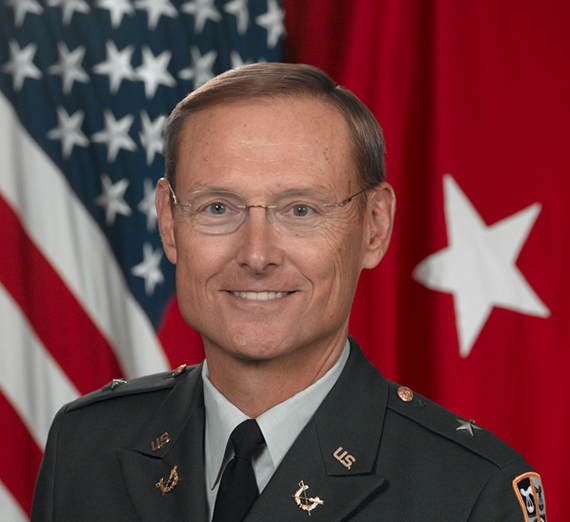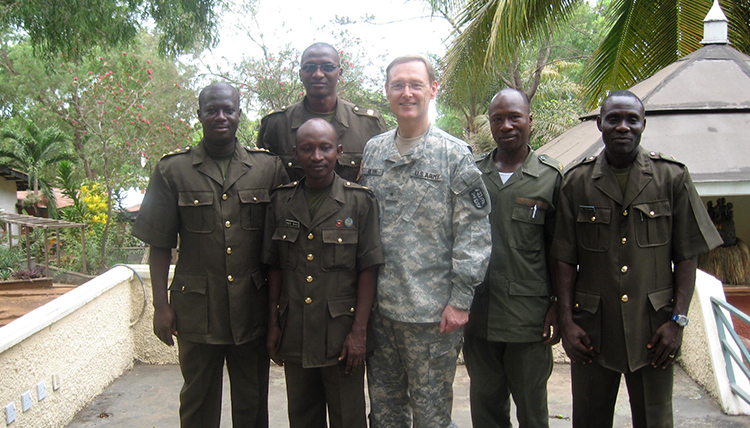This General Continues to “Fail” Retirement

Retired Brigadier General Jack Nevin, who earned his M.B.A. and Juris Doctor degrees from Gonzaga in 1978, says he is retired. But his wife Cheryl French Nevin, a retired physical therapist, disagrees, stating flatly, “Jack flunked retirement.”
Following a distinguished 33-year career in the U.S. Army active duty and reserve, Nevin retired in 2010. But he hasn’t really retired. He served as a District Court judge for Pierce County 1997-2012, with a couple of excused absences for active-duty service during that span, and no sooner had he retired from the Army, he was running for Washington State Superior Court judge, a position he held for two terms, 2012-2020.
But, of course, this longtime member of the Army’s Judge Advocate General’s Corps was still not done. He continues to serve as an adjunct professor at Seattle University School of Law, a position he has held since 1993. He teaches two courses in the fall, one in the spring. Additionally, he sits as a substitute judge on District and Superior courts and on occasion, the Washington State Court of Appeals.
His wife’s retirement grade appears to be fully substantiated.
Where It All Started
It would take a book to capture all that Jack Nevin has contributed to making this a better world. But suffice it to say, he has never wished he had done something else. Fully committed and charged with a passion for serving others – something he credits Gonzaga with infusing within him – he has always looked for ways to help.
He attended Washington State University for his undergraduate studies and competed as a hammer thrower on the track and field team. He enrolled in the ROTC program there, but track was his priority as the two endeavors competed for his time.
He re-enrolled in Army ROTC when he came to Gonzaga in 1974 for graduate school, earning a master’s in business administration, a master’s of science in commerce, and his law degree.
That led to his first appointment to the 9th Infantry Division at Fort Lewis, a three-year active-duty assignment that included studies at the JAG school in Virginia. Upon returning to Fort Lewis, Nevin served as a prosecutor, legal assistance officer and special assistant to the U.S. Attorney handling misdemeanor offenses committed by civilians occurring on military reservations.
He joined the Army Reserve following that, which began with two weeks of service every summer and one weekend per month. He served on missions to Korea, Honduras and Panama, and was placed on active duty during the Gulf War.
Nevin says the Reserve was at a low point when the Gulf War began in the late 1980s, but soon thereafter the Reserve became an essential element of the Army, soldiers being integrated into active duty as needed.

His Army career advanced rapidly, earning ranks as major, then lieutenant colonel while serving as deputy staff judge advocate at reserve command headquarters, the second most senior judge advocate in that command, which included roughly 3,000 soldiers throughout the Pacific Northwest. He graduated from the Air War College and the Army War College and served on active duty in Germany, Korea, and as a hospital judge advocate in Hawaii.
In 1998, he was promoted to full colonel and placed in command of a Legal Support Organization, considered a brigade level command. During this time, he began serving on missions with the Defense Institute of International Legal Studies (DIILS). These duties took him to Africa, eastern Europe, Central America and South America. His duties with DIILS included helping countries build governments, courts and civilian law enforcement while teaching them about public disclosure, transparency of government and standards of conduct. In Malawi he conducted the first-ever training in domestic violence prevention offered in south central Africa.
In 2001 he was selected to serve as the senior judge advocate and legal adviser to the commanding general of the 70th Army Reserve Support Command in Seattle. However, before he could assume that position, in early September of 2001 he received a call from the U.S. Department of State, asking him to serve as a civilian judge in Kosovo for the United Nations Detention Review Commission. Kosovo, still under UN control secondary to the Dayton Peace Accords following the war in Bosnia, continued to suffer the aftermath of the war, with ethnic crimes. As the UN now had criminal jurisdiction, it was necessary to empanel an independent body to adjudicate those crimes. In this civilian role, Judge Nevin was the presiding judge of a three-judge panel. With fellow judges from Germany and the United Kingdom, he rendered preliminary rulings based on charges leveled against Kosovo citizens alleged to have murdered and committed various atrocities against Serbian civilians. While the request arrived before Sept.11, 2001, the hearings took place approximately a week after Sept. 11. Judge Nevin found himself on one of the first post-9/11 commercial flights to Europe, a flight and experience which he describes as “unforgettable.” The political climate in Kosovo (and most of the world) was tense and security was tight. Bomb sniffing dogs preceded each hearing and judges were assigned security as there were reported threats to their safety. “When we finally reached our conclusions, we were shuttled out of Kosovo to Austria before our findings for the proceedings were published,” Nevin said.
The months immediately following 9/11 were busy and often chaotic, taking him away from the Pierce County District Court where he continued to serve as a judge. He credits the support and patriotism of his judicial colleagues for making that possible.
A Big Break
Now back in Seattle and his reserve command as staff judge advocate, a new commander, Maj. Gen. Lawrence Johnson, was just arriving. “He asked me to be his chief of staff, a position normally accorded to officers from combat posts. ‘I’m a lawyer,’ I said to the general. I was taken aback,” Nevin said.” However, General Johnson made it clear he liked the idea of a chief of staff who had commanded as a soldier but who was trained in management and dispute resolution as a judge.
“I took the job, and ultimately was in charge of every section, from training to budget to HR and even information technology. For all military and civilian employees,” Nevin explained. This was a Regional Support Command, the highest level of operations in the Army Reserve.
Nevin was working 40 hours a week as a District Court judge in Tacoma, then another 30 hours as chief of staff in Seattle. He quickly became familiar with rush hour traffic on I-5.
No doubt Nevin’s commitment to duty played a big part in his promotion to brigadier general in 2004.
“Like all general officers I remember vividly how I received the news of my promotion. The list of promotions is published internally on a Monday, but, I didn’t receive a call. I called Maj. Gen. Johnson and advised him I had not been selected. I thoroughly enjoyed being a chief of staff and working for General Johnson and looked forward to continuing in that job and applying to the next board, the following year.
“The next day, however, I received a call from the Pentagon, informing me to expect a call at 1 p.m. from the commanding general of the Army Reserve. I told Maj. Gen. Johnson that ‘I’m either in a lot of trouble or I’m being promoted.’ ”
It was, indeed, a positive outcome. As a general, he spent 100-150 days each of the next four years on active duty. While initially selected to serve as chief judge of the U.S. Army Court of Criminal Appeals, he ultimately led the reorganization of all legal assets in the Army Reserve. Specifically, he was tasked to take all legal billets whether officer or enlisted from approximately a dozen organizations, located in 30 states and Puerto Rico, and organize them into a single command headquartered in the Washington D.C., area, where his office was located. He became commanding general of the U.S. Army Reserve Legal Command and led the organization through its provisional period. While his efforts met with significant opposition from various corners of Army leadership, it was ultimately successful. As the wars in Iraq and Afghanistan progressed, it became apparent that 50% of all the legal personnel in the theater of operations came from the reserve force, and an efficient means to mobilize these assets required a single command.
Perhaps its time for this hardworking, giving and creative soul to listen to his wife and spend more days fly fishing, golfing, exercising and traveling. But in Nevin’s mind, there’s still work to be done.
And for that he gets an A+.
Gonzaga’s ROTC: 75 Years Strong
In 2022-23, Gonzaga’s ROTC Program celebrates 75 years of meeting the country's requirement for officer-leaders in the U.S. Army – active duty, National Guard and Reserves.
Gonzaga established the first informal Cadet Detachment in 1897 and the modern-day program in 1947. The Bulldog Battalion also includes student-cadets from Whitworth University and Washington State University College of Nursing.
The United States Army Cadet Command consistently ranks Gonzaga in the top 15% of the nation’s ROTC programs.
